Hans Becker, the maverick seeking to transform retirement living
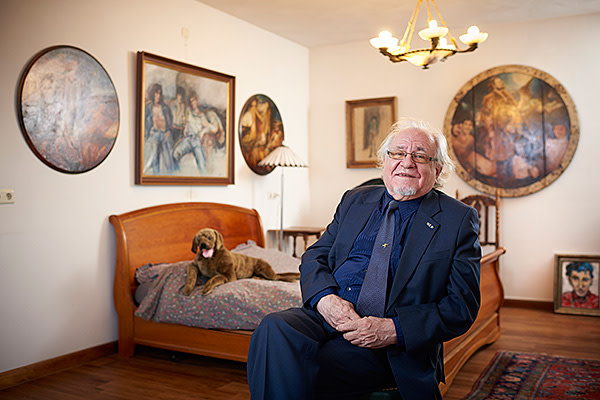
Simply sign up to the Life & Arts myFT Digest -- delivered directly to your inbox.
Slightly drunk, eyes welling with tears, Hans Becker leans over the remnants of our fish supper to explain how he prepared a man to kill himself.
“He was terribly ill; he had decided to end his life the next day and he told me he wanted raw herring and champagne for his last meal.”
It was late at night. Becker summoned the kitchen staff to prepare the herring at the man’s senior living development in the Netherlands, where euthanasia is legal. The home is one of 33 run by Humanitas, the Rotterdam foundation that Becker ran as chief executive for two decades. However, that night, the bar only stocked prosecco. So Becker drove home to collect a bottle of Moët.
Poking around his apartment in Rotterdam the morning after our dinner I find no wine cellar. And you wouldn’t expect one in an eighth-floor penthouse in a building barely a decade old. Yet neither Becker, 74, nor his home are remotely conventional.
He is an iconoclastic radical who for more than 30 years has devoted himself to upending elderly care in the Netherlands and, increasingly, across the world (in October China’s National Real Estate Managers’ Association appointed him chief international expert of ageing care). The style of his home is somewhere between medieval castle and art-deco monument.
The bedroom features several paintings of the younger Becker — in one he sports a striking navy overcoat and thick black beard — interspersed with several of his adopted son, Mohamed, and Becker’s husband, Ali (Becker has been married for nine years but it is an open relationship, he says; he and his husband live in separate homes).
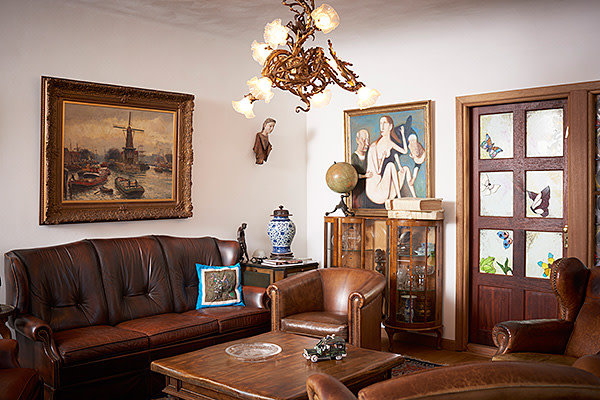
Throughout the home I count seven panes of stained glass, cut into ceilings and dividing walls and in place of external windows. Besides a medieval-style oak table, the sitting room contains a fireplace surround from a Dutch castle, dated 1640. Oil paintings — mainly pastoral scenes — pepper the walls, bronze Renaissance-style figurines the surfaces. I tap away at ubiquitous wooden panels searching for a hidden drinks cabinet.

That Europe’s maverick of housing for older people has submitted his interiors to this conscious act of ageing may seem like a pithy allegory. But it is coincidence: both the location — on the water in Delfshaven, the one-time port in southern Rotterdam — and the interiors are an act of personal nostalgia for his childhood home, half a mile away. “It was an old-fashioned wooden Dutch house; my father worked in a shipping bank. I can enjoy the bustle of the water — boats coming and going — as I did when I was a child.”
Apart from getting him emotional, Becker’s euthanasia story is intended to make a point about the wellbeing of residents, or “clients” as he calls them. He says that when he arrived at Humanitas they were opting to end their lives at a rate of one every three months. In his last five years, the man who went to his grave on Moët and herring was Becker’s only case.
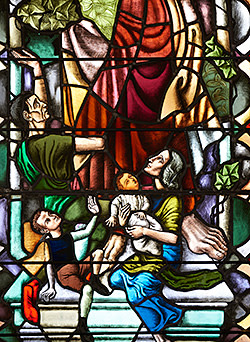
“It’s all about happiness,” he says at the start of our fish supper evening, which takes place at a Humanitas development in Rotterdam’s north. For reasons that soon become clear, we are in the bar. Every Humanitas building has one. In this case, it is nestled on the edge of an expansive restaurant lined with bookcases at one end and a busy, well-decorated and well-used smoking room. At the other end of a towering atrium are a hairdresser, grocers, a fancy clothes and homeware boutique and a beauty salon.
The bar is surrounded by paintings, many of which belong to Becker. Back at his home the rooms are littered with them, piled into boxes or propped up against the bookcases in his study. Another 300 are in storage, he says. His taste is figurative but unconventional. His favourite, “Dancing on Ice”, painted by Alexander Shuritz in 1993, features two couples waltzing across a barren snowscape beneath a clear night sky. Becker invited Shuritz from Siberia to paint at Humanitas for a few months that year. Interesting art, he says, helps draw clients out of themselves and into conversation.
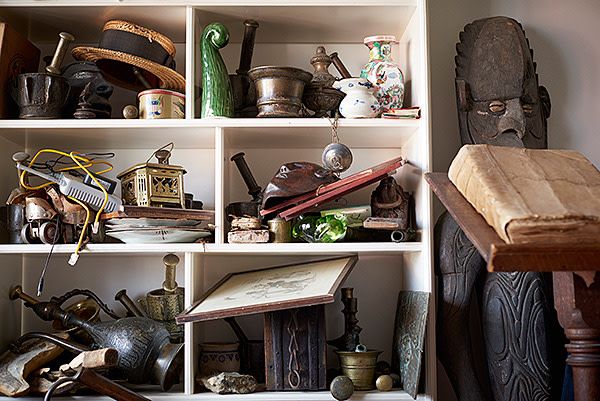
Becker’s clients are a combination of owners, renters and those who qualify for social housing. Most are elderly, but some just like the facilities and “extended family” of communal living.
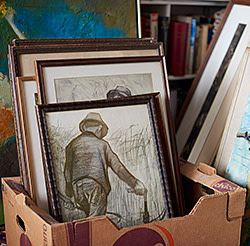
Becker certainly does. Four years since he left Humanitas, everyone at the bar still knows him. Tonight it is busy — a good sign: heavy drinking means that people are enjoying life, he says, which is all he’s really interested in.
“If people want every day to be drunk or to spend all day smoking or have five cats cluttering up their apartment, who are we to stop them? It is you who must decide what is good for you,” he says.
Whatever residents want, within reason, Humanitas provides. This is Becker’s “yes culture” — the term recurs constantly, along with several others: “extended family”, “be your own boss” and “use it or lose it” — meaning focus on what’s still working, not what’s not, and make the best use of it.

Becker’s rejection of conventional care homes is fierce and personal. “People there are patronised,” he says. “I have always hated to be patronised.” Draconian rules combine with a focus on illness and degeneration to rob people of their independence. He calls them “islands of misery”. Early on, he worried that clients wouldn’t take this iconoclastic message of self-empowerment seriously. So he set an example. “For the first few months, I came every afternoon drunk at the bar,” he says.
Back in the Humanitas bar, I battle the gin and tonic to summon some critical acumen: surely a paean to life’s intoxicating pleasures is no foundation for a model of senior living? Becker is dismissive. “The alcohol is incidental; I don’t care what people do.” The point is to listen to what people want and focus your efforts there. This means throwing off the medical obsession with poor health and decline.
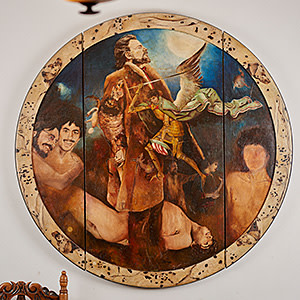
“You complain to the nurse that you have a bad knee. She costs 50 cents per minute. You see the doctor; he is €1 per minute. You see the physio; he is 75 cents per minute. Four hours of spending money and still your knee is hurting — of course it is; you are old. But if I put a cat on your knee, or you spend four hours at the bar, you are not thinking about your knee.”
This is a compelling business model, I observe. Bartenders are cheaper than doctors. His focus on cultivating independence saw staff-resident ratios slashed by a factor of three. In 20 years, he says, Humanitas went from making a loss to a surplus of €54m, which was ploughed back into renovation, decoration and new homes.
That his model costs less is incidental, however. The point is that people are happier, he says, launching into another anecdote. A woman aged 99 arrived from a care home where there were no facilities in which to cook — one of her longstanding passions. At Humanitas she started again. “Aged 104 she told me ‘I am tired and ready to die now but you must promise me: lay out my body in my flat so people can say goodbye’. I agreed. A few days later she had passed away.”
A sprightly 77-year-old in a baseball cap and fashionable parka bounds out of the smoking room. “Alcohol is the best medicine,” he quips to Becker. But the Dutchman is lost in the memory, crying once more.
Photographs: Jeroen Bouman
Comments